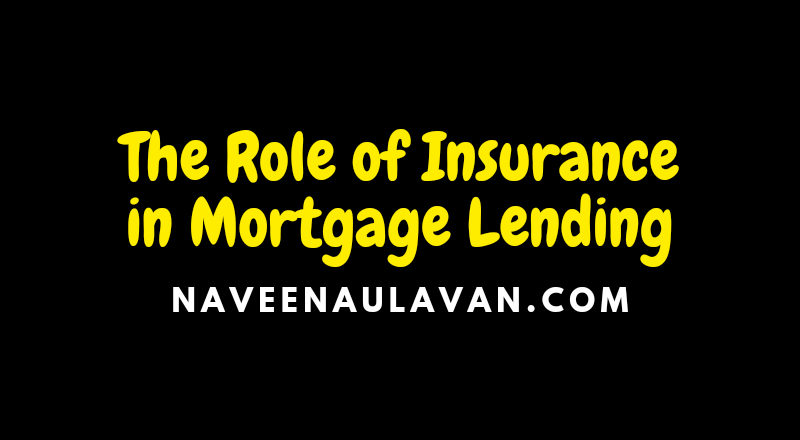Insurance plays a crucial role in the mortgage lending industry providing protection for both lenders and borrowers against potential risks and uncertainties. When individuals or businesses seek a mortgage loan to finance the purchase of a property insurance serves as a safeguard that helps mitigate financial loss and promotes the stability of the lending process. This article will explore the various types of insurance involved in mortgage lending and the importance they hold in ensuring a secure and reliable lending environment.
Types of Insurance in Mortgage Lending
Mortgage Insurance
Mortgage insurance is a type of insurance primarily designed to protect the lender in the event that a borrower defaults on their mortgage loan. It provides financial security to lenders by reimbursing them for a portion of their losses if the borrower fails to repay the loan. Mortgage insurance is typically required when the borrower makes a down payment of less than 20% of the purchase price.
There are two main types of mortgage insurance:
Private Mortgage Insurance (PMI)
PMI is typically required for conventional mortgage loans when the borrower’s down payment is less than 20% of the purchase price. It is provided by private insurance companies and offers protection to lenders against potential losses incurred due to borrower default. PMI premiums are usually added to the borrower’s monthly mortgage payments until a certain equity threshold is reached at which point the PMI may be canceled.
Federal Housing Administration (FHA) Mortgage Insurance
FHA mortgage insurance is a form of insurance provided by the Federal Housing Administration a government agency. It is required for FHA loans which are mortgages insured by the FHA and typically have more lenient eligibility requirements than conventional loans. FHA mortgage insurance protects lenders by reimbursing them in the event of a borrower default allowing lenders to offer mortgage loans to individuals who may have less than ideal credit or financial circumstances.
Homeowners Insurance
Homeowners insurance also known as hazard insurance is a type of insurance that protects both borrowers and lenders in the event of damage or loss to the property. It covers a wide range of risks including fire theft natural disasters and liability for any injuries that occur on the property. Homeowners insurance is typically a requirement for mortgage lenders as it ensures that the property is adequately protected safeguarding the lender’s investment.
Title Insurance
Title insurance is a type of insurance that protects lenders and borrowers against potential losses arising from problems with the property’s title. It ensures that the property has a clear and marketable title free from any liens encumbrances or other legal issues that could affect ownership. Title insurance provides financial protection in case any previously undisclosed claims or legal disputes arise protecting both lenders and borrowers from potential financial loss.
Importance of Insurance in Mortgage Lending
Risk Mitigation
Insurance plays a crucial role in mitigating risk within the mortgage lending industry. By requiring borrowers to secure insurance lenders are protected in the event of a borrower default property damage or title issues. Without insurance lenders would be exposed to significant financial risks that could jeopardize their ability to recover loan amounts or sustain profitability.
Increased Accessibility to Mortgage Loans
Mortgage insurance particularly PMI and FHA mortgage insurance enables borrowers with smaller down payments or less favorable credit profiles to access mortgage loans. By providing additional protection to lenders mortgage insurance reduces the level of risk associated with lending to these borrowers. This in turn encourages lenders to extend loans to a broader range of potential homeowners promoting homeownership and expanding access to mortgage financing.
Protection for Borrowers
Insurance not only protects lenders but also provides critical safeguards for borrowers. Homeowners insurance protects borrowers from significant financial losses in the event of property damage or destruction. Title insurance ensures that borrowers have a clear ownership claim to the property safeguarding their investment and preventing potential legal battles over ownership rights. By requiring insurance lenders promote the interests and financial well-being of their borrowers as well.
Stability and Confidence in the Market
Insurance is essential for maintaining stability and confidence in the mortgage lending market. By having insurance requirements in place lenders can trust that their investments are protected reducing the level of uncertainty and risk. This stability encourages lenders to continue participating in the mortgage market which contributes to the overall health of the industry.
Compliance with Regulatory Requirements
Insurance is often a regulatory requirement for mortgage lending ensuring compliance with laws and regulations. Government-backed mortgage programs such as FHA loans have specific insurance requirements that must be met to qualify for the program. Lenders who do not comply with these requirements may face legal consequences and potential financial penalties. Insurance therefore serves as a mechanism for lenders to demonstrate compliance with regulatory mandates.
Conclusion
Insurance plays a crucial role in the mortgage lending industry benefiting both lenders and borrowers. It provides protection against potential risks promotes accessibility to mortgage loans safeguards borrowers’ interests fosters stability in the market and ensures regulatory compliance. By understanding the different types of insurance and their importance stakeholders in the mortgage lending process can make informed decisions and contribute to a secure and reliable lending environment.
